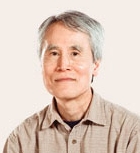Student Profiles
Osamu Muramoto
(excerpted from Reed Magazine, September 2011)
 Who I was when I got to Reed
Who I was when I got to Reed
I am a neurologistwith an interest in bioethics and the neuroscience of mind. What I knew was science. Before going through MALS I thought philosophy was somewhat vague, floating around, inaccessible. Now, philosophy and science are tightly linked in my mind.
Why I took the MALS program
Having been born in Tokyo and attended medical school there, I wanted to go through formal education in English. Philosophy is basically an art of language and many concepts cannot be successfully translated. You can communicate the message of the pieces in translation, but you lose the subtlety of the messages. Heidegger, for example, wrote in German, and in German you can combine words together to make a new word, which translators struggle to translate. So they paraphrase Heidegger’s words. The same is true if I read American philosophical writing in Japanese; they have to paraphrase in translation. You lose the direct power of the words that appear in the original writing. Osamu graduated from the MALS program in January 2011.
Thesis: Death and Wellbeing—A Reply to the Epicurean Puzzle
Epicurus famously claimed that death is nothing because it has no time or person to harm; before death it is not yet, and after death it is no more. I argued that the standard account against Epicurus is flawed and presented an alternative view of human life and death.
Cool stuff I did
I learned how to deal with real philosophers in terms of their thoughts, writings, and behaviors. I was also able to publish two papers based on the coursework at Reed in respectable medical journals.
Obstacles overcome
I had to make an enormous leap from my previous higher education, received almost four decades before in a different country, in a different area of study, and in a different language. In every subject I studied at Reed, I needed extra groundwork to brush up the very basics. I purposefully took many undergraduate courses and studied along with young students, who are younger than my own children.
How Reed changed me
I am now able to think, read, and talk more clearly and logically than before, particularly in the area of philosophy. This change helps my further pursuit in bioethics tremendously. After all, an old dog has proven, at least to some extent, to be able to learn new tricks.
What’s next
Teaching medical students about ethics, particularly in end-of-life issues, at Oregon Health & Science University.